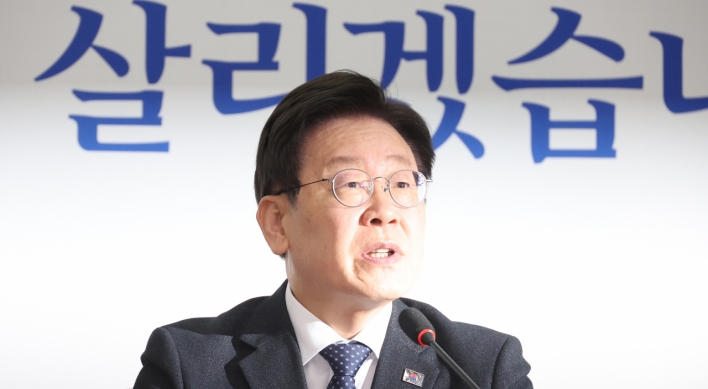[Editorial] Embarrassing lesson
Government negligent in bid to attract foreign hospital
By Korea HeraldPublished : Sept. 16, 2014 - 20:45
The Health Ministry’s rejection of a Chinese firm’s plan to build a for-profit foreign hospital on Jejudo Island is a lesson that should not be lost on the government as it pursues a policy of broad deregulation.
In an embarrassing fiasco, the ministry dismissed a proposal by China Stem Cell to build a 50 billion won hospital on Jejudo Island, a month after the Health Ministry said it would issue its decision on the Shaner Hospital & Health Care Center in September. That remark was made during a meeting on trade and investment promotion led by President Park Geun-hye, sending a signal that the plan would be approved.
By the time of last month’s meeting at the Blue House, however, it was already suspected that the Shaner Hospital might not materialize as it had become widely known that CSC had put up for sale the land earmarked for the hospital. The company’s Jeju office employees had stopped coming to work.
In fact, the firm’s parent company, Tianjin Huaye Group, recently declared bankruptcy and its chairman was arrested last year in connection with fraudulent loans. The fact that the government was unaware of these important developments reveals how unprofessional it has been in pursuing the creation of the country’s first for-profit foreign hospital.
CSC submitted a plan in February 2013 to build a 48-bed hospital in Seogwipo, Jejudo Island, that would offer stem cell therapy as part of its cosmetic treatments. The plan was rejected in August that year due to Korean laws restricting stem cell therapy. The company then revised its plan, deciding to focus on plastic surgery and dermatology treatments for Chinese tourists.
In rejecting the Shaner Hospital plan on Monday, the Health Ministry cited the company’s financial instability, its lack of provisions for emergency situations and suspicions that illegal stem cell therapies might still take place at the hospital.
The Shaner Hospital proposal was the first proposal to build a for-profit foreign hospital since such entities were permitted in Free Economic Zones in 2003 and on Jejudo Island in 2006. Efforts to attract world-class medical institutions for more than a decade remained fruitless and the government may have been eager to accommodate the Shaner Hospital deal, although what it offered was hardly the advanced medical facilities and expertise that the government hoped to attract.
It is absurd that the proposal for the country’s first for-profit foreign hospital was handled in such a shoddy manner. The government was clearly rushing to produce tangible results and did not thoroughly review the financial status of Tianjin Huaye, even after reports of its difficulties and trouble with the law surfaced. The case should be a reminder of how not to proceed as the government continues its attempts to attract still controversial for-profit foreign hospitals.
In an embarrassing fiasco, the ministry dismissed a proposal by China Stem Cell to build a 50 billion won hospital on Jejudo Island, a month after the Health Ministry said it would issue its decision on the Shaner Hospital & Health Care Center in September. That remark was made during a meeting on trade and investment promotion led by President Park Geun-hye, sending a signal that the plan would be approved.
By the time of last month’s meeting at the Blue House, however, it was already suspected that the Shaner Hospital might not materialize as it had become widely known that CSC had put up for sale the land earmarked for the hospital. The company’s Jeju office employees had stopped coming to work.
In fact, the firm’s parent company, Tianjin Huaye Group, recently declared bankruptcy and its chairman was arrested last year in connection with fraudulent loans. The fact that the government was unaware of these important developments reveals how unprofessional it has been in pursuing the creation of the country’s first for-profit foreign hospital.
CSC submitted a plan in February 2013 to build a 48-bed hospital in Seogwipo, Jejudo Island, that would offer stem cell therapy as part of its cosmetic treatments. The plan was rejected in August that year due to Korean laws restricting stem cell therapy. The company then revised its plan, deciding to focus on plastic surgery and dermatology treatments for Chinese tourists.
In rejecting the Shaner Hospital plan on Monday, the Health Ministry cited the company’s financial instability, its lack of provisions for emergency situations and suspicions that illegal stem cell therapies might still take place at the hospital.
The Shaner Hospital proposal was the first proposal to build a for-profit foreign hospital since such entities were permitted in Free Economic Zones in 2003 and on Jejudo Island in 2006. Efforts to attract world-class medical institutions for more than a decade remained fruitless and the government may have been eager to accommodate the Shaner Hospital deal, although what it offered was hardly the advanced medical facilities and expertise that the government hoped to attract.
It is absurd that the proposal for the country’s first for-profit foreign hospital was handled in such a shoddy manner. The government was clearly rushing to produce tangible results and did not thoroughly review the financial status of Tianjin Huaye, even after reports of its difficulties and trouble with the law surfaced. The case should be a reminder of how not to proceed as the government continues its attempts to attract still controversial for-profit foreign hospitals.
-
Articles by Korea Herald




![[Herald Interview] 'Amid aging population, Korea to invite more young professionals from overseas'](http://res.heraldm.com/phpwas/restmb_idxmake.php?idx=644&simg=/content/image/2024/04/24/20240424050844_0.jpg&u=20240424200058)







![[Hello India] Hyundai Motor vows to boost 'clean mobility' in India](http://res.heraldm.com/phpwas/restmb_idxmake.php?idx=644&simg=/content/image/2024/04/25/20240425050672_0.jpg&u=)






![[Today’s K-pop] NewJeans' single teasers release amid intrigue](http://res.heraldm.com/phpwas/restmb_idxmake.php?idx=642&simg=/content/image/2024/04/26/20240426050575_0.jpg&u=)